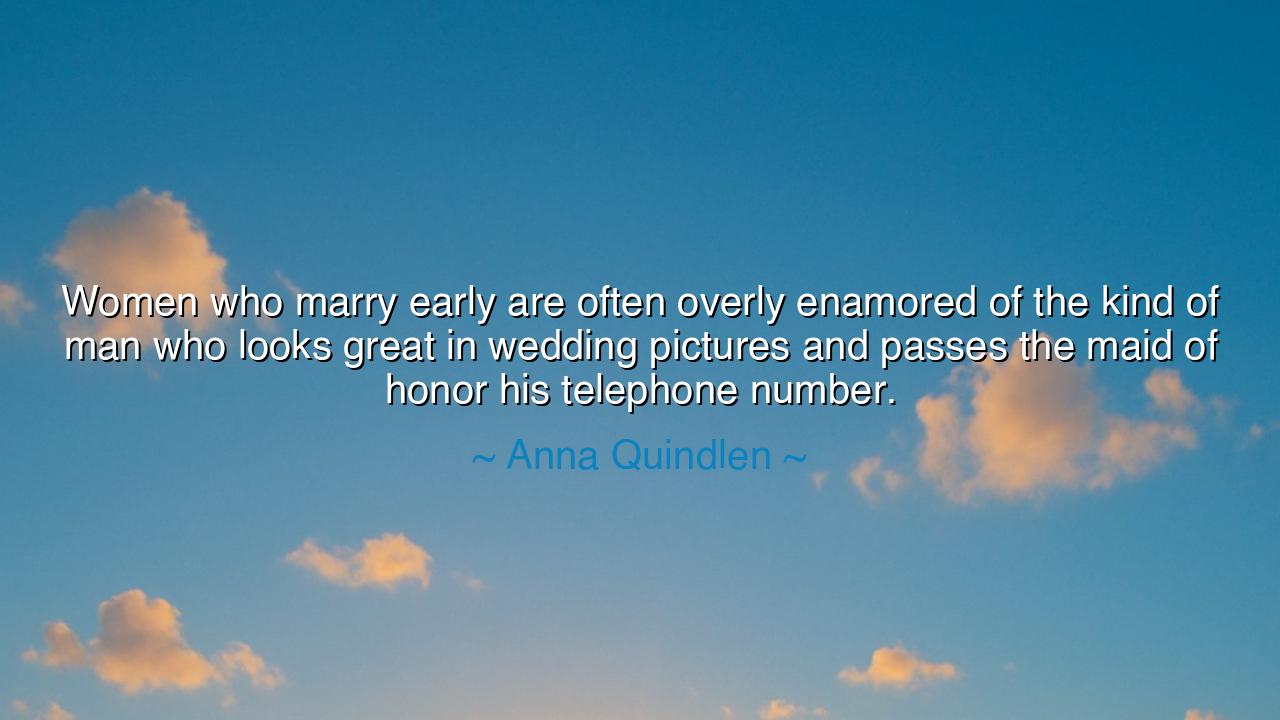
Women who marry early are often overly enamored of the kind of
Women who marry early are often overly enamored of the kind of man who looks great in wedding pictures and passes the maid of honor his telephone number.






The words of Anna Quindlen—“Women who marry early are often overly enamored of the kind of man who looks great in wedding pictures and passes the maid of honor his telephone number.”—speak with the sharp clarity of wisdom earned through observation. They warn against mistaking appearances for substance, against binding one’s life to a man who dazzles in the moment of the wedding but falters in the labor of love. For true devotion is not measured in photographs or charm, but in fidelity, respect, and constancy.
This utterance unveils the danger of immaturity and illusion. When young hearts rush toward marriage, they may be seduced by surface—by the man who shines in ceremony, who knows how to pose for the crowd, who seems perfect in the fleeting light of the day. Yet Quindlen reminds us that such men may reveal their true selves not in vows, but in betrayal, reaching out in secret to the maid of honor even as the bride begins her new life. Thus, she teaches that wisdom in love is not found in haste, but in discernment.
History echoes this truth in the story of Anne of Cleves, chosen as wife to King Henry VIII largely for her appearance in a portrait. She was admired in image, yet when reality came, the king found no joy in the union, casting her aside for another. The marriage, built on appearances rather than substance, dissolved quickly. So too does Quindlen’s observation warn: when love is chosen for spectacle rather than character, it risks collapse.
The quote also shines a light upon the difference between charm and character. A man may charm a room, may shine in the photographs, may dazzle a bride with surface brilliance—but character is proven in the quiet days, in the years after the feast, in the way he honors his promises when no crowd watches. Quindlen’s words remind us that the true measure of a partner is not how he appears at the altar, but how he behaves in the long silence afterward.
Let this wisdom endure: beware the glitter that blinds, and seek the substance that lasts. A wedding picture fades, but loyalty endures. Charm may win hearts for a day, but integrity sustains love for a lifetime. As Anna Quindlen teaches, let not youthful haste bind you to one who lives for spectacle; instead, choose one who, even when unseen, proves worthy of the vow. For in this lies the difference between heartbreak and a love that endures through all the years.






TNNguyen Thanh Nga
This quote makes me think about how easily people idealize love before they’ve truly lived enough to understand it. Marrying early isn’t inherently wrong, but doing so for the wrong reasons—like looks or status—sets up heartbreak. It’s an interesting commentary on maturity and discernment. How do we balance the romantic spontaneity of youth with the wisdom needed to choose a lifelong partner?
NHNguyen Huy
What stands out to me is the subtle cynicism in this quote—it’s funny, but there’s a sting of truth. Maybe Quindlen is pointing out how early relationships are often driven by excitement, not understanding. I wonder if this applies only to young women or also to men who marry early for similar superficial reasons. Is age really the problem, or is it emotional readiness?
TThu
This statement feels like a social critique disguised as humor. It exposes how romantic fantasies and vanity can distort our choices. I can’t help but think about how media reinforces that—the idea of the ‘dream wedding’ and the ‘handsome groom.’ Should we be blaming immaturity or the culture that sells perfection over authenticity? It’s a sharp reminder that appearances can be deeply misleading.
DDTa Dinh Dung
Anna Quindlen’s observation feels both witty and painfully true. I think she’s highlighting how youth and inexperience can blur judgment. When you’re young, it’s easy to confuse attraction or social validation for love. But how do we teach emotional maturity in a world obsessed with image? Maybe the real issue isn’t early marriage itself, but the lack of self-awareness before committing to one.
QTQuỳnh Tram
This quote hits hard because it speaks to the illusion so many people fall for—choosing appearance over character. It’s not just about women marrying early; it’s about anyone mistaking surface charm for substance. It makes me wonder if societal pressure to have the ‘perfect’ wedding or partner pushes young people into shallow relationships. How many marriages fail because they start as photo opportunities instead of genuine partnerships?